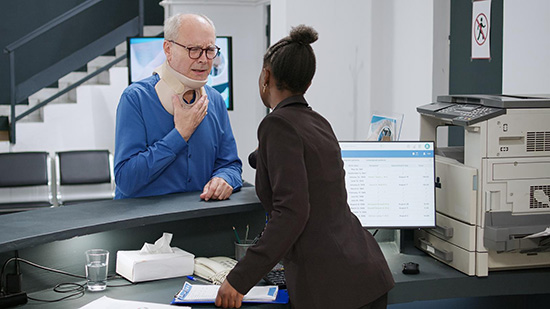Learn how to prove your carpal tunnel is work-related so you can get maximum workers’ comp benefits during your recovery
Carpal tunnel syndrome (CTS) is a prevalent condition in the workplace, particularly among workers performing repetitive tasks. If you’re currently suffering from carpal tunnel, it’s crucial to understand the symptoms and risks and your rights regarding workers’ compensation in cases where your CTS is related to your job.
In Columbia, South Carolina, the work injury attorneys at Chappell, Chappell & Newman are committed to guiding workers through the complexities of workers’ compensation claims for carpal tunnel syndrome. Learn how we can help you by scheduling a free consultation.
What are the symptoms of carpal tunnel syndrome?
Carpal tunnel syndrome primarily affects the wrist and hand, with symptoms that typically include:
- Numbness or tingling in the thumb, index, middle or ring fingers
- Pain radiating from the wrist and up into the arm or down into the hand
- Weakness in the hands, leading to difficulty grasping or holding objects
- Sensations of swelling in the fingers, even when no swelling is visible
Can carpal tunnel heal on its own?
Mild cases of CTS can sometimes improve without surgery, especially if they’re related to specific activities and those activities are modified or ceased. Rest, wrist splinting, and anti-inflammatory medications can help alleviate symptoms in many cases. However, without addressing the underlying causes, symptoms may persist or worsen over time.
What is the long-term damage from carpal tunnel?
If left untreated, CTS can lead to long-term damage, including:
- Permanent nerve damage leading to decreased sensation in the fingers
- Weakened hand muscles and loss of fine motor skills
- Chronic pain or discomfort
Because these complications can be severe and debilitating, it’s crucial to seek early treatment to prevent permanent injury.
Are people who work more likely to develop carpal tunnel than those who don’t?
The short answer is yes. According to a study published in the National Library of Medicine, the lifetime prevalence of carpal tunnel syndrome (CTS) among adults is approximately 8%.
However, this rate varies significantly based on employment status, being as low as 3.6% among those who have never been employed and rising to 12.2% among those who have worked or are currently working. It’s estimated that about 4.8 million workers experience CTS every year.
Which workers are most at risk of developing carpal tunnel?
Workers most at risk for developing carpal tunnel syndrome are typically those whose job duties involve repetitive hand and wrist movements, forceful gripping, or vibrating tools. This includes a broader range of occupations, such as:
- Hairdressers
- Office workers
- Mechanics
- Cooks and chefs
- Cleaners and janitors
- Gardeners and landscapers
Due to the nature of their work, these professions necessitate continuous or repetitive use of the hands and wrists, making workers in these fields more susceptible to developing CTS.
What To Do After a Work Injury or Illness in South Carolina
Learn the steps to follow to increase your chance of a successful workers’ comp claim.
Will workers’ comp cover carpal tunnel?
In South Carolina, those suffering from carpal tunnel syndrome may be eligible to receive workers’ compensation benefits for medical expenses, lost wages during their recoveries, and even vocational rehab if they can’t return to their former jobs, but there are specific criteria that must be met for a successful claim.
Firstly, the individual seeking compensation must be an employee. Independent contractors, volunteers, and certain other categories of workers may not be eligible under the state’s workers’ compensation laws.
Next, to establish a claim for CTS under workers’ compensation, the employee must be able to prove that the condition is work-related.
Is it hard to prove carpal tunnel is work-related?
Sometimes. Since carpal tunnel syndrome is considered an occupational disease that develops slowly over time, it can be more difficult to definitively prove the condition is directly caused by an employee’s work or job duties.
Key factors in proving this link include:
- Nature of job duties. Showing that the job involves activities known to contribute to CTS, such as repetitive hand and wrist movements, prolonged use of vibrating tools, or tasks requiring forceful gripping.
- Medical evidence. Obtaining a medical diagnosis from a health care professional that supports the claim that the CTS is related to work activities. This may include medical records, doctor’s statements, and, potentially, an independent medical examination.
- Documentation of work activities. Providing detailed records of work tasks and schedules that can illustrate the repetitive or strenuous nature of the job.
- Duration of employment. Establishing the length of time in the job or performing specific tasks that may have contributed to the condition.
- Exclusion of non-work-related factors. Demonstrating that other non-work-related activities or pre-existing conditions are not the primary causes of CTS.
It’s advisable for workers in South Carolina who believe they have developed CTS due to their job to seek legal advice before filing a workers’ comp claim. An experienced workers’ compensation attorney can help gather evidence, navigate the claim process, and represent the workers’ interests to ensure they receive the appropriate compensation.
My Workers’ Comp Claim Is Denied, Now What?
Learn what to do if your workers’ comp claim is denied in South Carolina.
Is carpal tunnel considered a permanent injury?
CTS can potentially be considered a permanent injury, especially in cases where it leads to irreversible nerve damage or chronic impairment. The permanency of the injury typically depends on the severity of the condition, the effectiveness of treatment, and the individual’s response to treatment.
In workers’ compensation cases, if CTS is deemed a permanent condition, it may qualify the individual for permanent disability benefits, reflecting the ongoing impact on their ability to work and perform daily activities.
Chappell, Chappell & Newman can help with your carpal tunnel workers’ comp claim
Carpal tunnel syndrome is a serious condition that can significantly impact your ability to work and perform daily activities. If you believe your CTS is related to your job in Columbia, South Carolina, and you’re considering filing a workers’ compensation claim, Chappell, Chappell & Newman are here to help.
When it comes to occupational diseases like carpal tunnel, we understand how to establish that the condition is work-related and can guide you through the process to ensure you receive the benefits you deserve.


